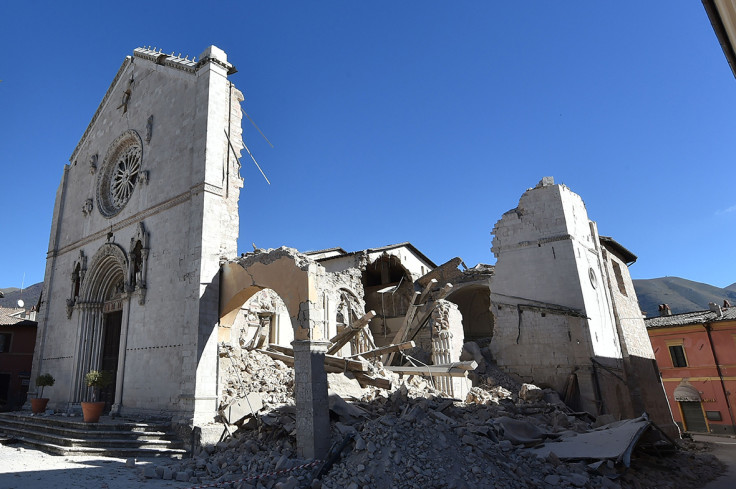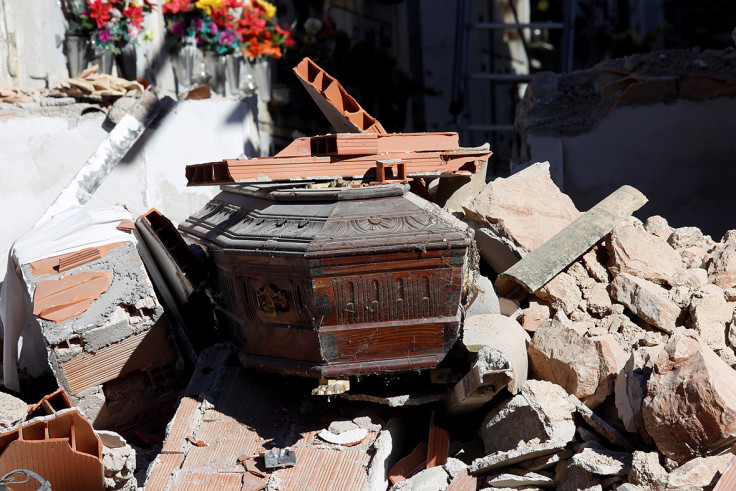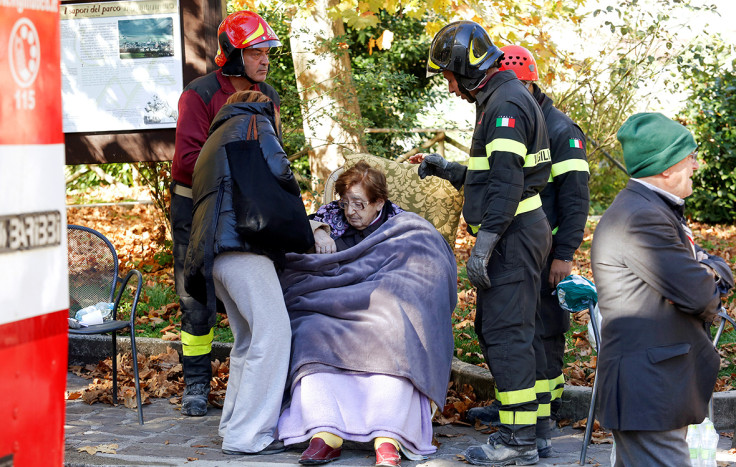In the earthquake-hit town of Norcia, people are left with nothing but themselves
More than a week after the strong earthquakes, tremors can be still felt every few minutes.
Gentilina Loretucci has no memory of how she made it out of her house when the first earthquake struck the town of Norcia, central Italy, on 24 August. But she remembers the latest earthquake, on 30 October, vividly. "It was like in a film, I got out of the house as the walls were crumbling down – it was dumb luck I made it outside," she recalled in a phone conversation with IBTimes UK. As she spoke, ambulance sirens could be heard in the background. "It's like being in a warzone" she said.
By the time the 6.5-magnitude earthquake struck, she and her family, a total of 8 people, were living in a 40sq m (130sq ft) wooden shed. She would still go back to the house to do laundry and take away whatever was needed, but the latest quake, the strongest registered in Italy since 1980, left nothing untouched.
For two days, the family was left without light, gas or water. "I went around to the authorities begging for a torchlight, some candles, something to make light with. I could not find anything," she said. Loretucci and her family lives in the countryside of the ancient town of Norcia, surrounded by the Appennine mountains, and the lack of street lights means it is pitch black outside.
The 54-year-old woman feels she has been left in the dark by the authorities, too. "We were left to ourselves. When I asked for help on the 24th [after the earthquake in August] they told me not to exaggerate. We were three people who had a house, and now none of us has one," she said, referring to her two daughters whose houses also crumbled, like hers, suddenly leaving them with nowhere to go.
They were offered shelter in a neighbour's barn for two months. The barn hosted as many as 30 people at a time, but it had to bathroom and no kitchen. "No one came for us. No one gave us a tent. I asked for a chemical toilet at least, but we could not get anything. We had to go out in the open air, using buckets," she said.

The tents that had been set up in Norcia in August were taken away in the beginning of October, before the new series of earthquakes struck. Children had even begun going to school again, in the same buildings that have now been declared unsafe. Now large parts of Norcia, the so-called "red zone", are sealed off from the townspeople as there is still a risk the buildings may be crumbling down, especially since the earth has not yet stop shaking in the area and tremors between 2.0 and 3.8 magnitudes can be felt every few minutes.
Loretucci told IBTimes UK about how people from near and far came together to support one another. Some of her friends came from Venice to help them build a little kitchen and a bathroom in the wooden shed where the family eventually moved to. But what touched her the most was the call from a young man whom she had hosted in her house, when he was backpacking through Italy in September 2014.
In hearing what that the family who were so generous to him had lost their home in the August earthquake, Lorenzo Holt set up a crowdfunding page to raise some money to support them. "I'm so grateful to him. When Lorenzo called me, it felt like a beacon of light in this total darkness, because I felt the affection of people close to me. He's like a son to me," she said. The funds he collected from his family and friends made Loretucci feel less alone – even though, as the banks are still closed, she has not yet been able to access them.

Supermarkets, shops and post offices are still closed too. The emergency services focused on offering assistance to the hospital, and set up an open-air kitchen that prepares an average of 600 warm meals a day. The rescue and relief efforts are coordinated at the national level by the civil defence (Protezione Civile), and the operations include several organisations, such as the Italian Red Cross (Croce Rossa Italiana, CRI) and the army.
Tommaso Della Longa, CRI spokesman, told IBTimes UK the relief services are working hard to respond to every need of the population. "The first-emergency system has worked" he said. "Surely there are issues. There are undeniable logistical difficulties," he added, referring to the mountainous landscape that has slowed down the arrival of trucks and supplies.
In Norcia, the schools are still closed, although an emergency one is being set up. But those who worked in there, like Loretucci, a school kitchen cook, no longer have a job. Her daughters too have lost their jobs in the earthquake. Her partner is the only one who still earns a living, as he is part of the military police (carabinieri) –but for many who are still in Norcia, life has come to a standstill.
"Yesterday (3 November) a laundromat opened, we spent the day there doing laundry, and that's how you live. Waiting. Going around to ask for assistance, to find something to cover the roof," she said. "The children are frightened. My granddaughter, who is now 14-months-old, at every new tremor she feels, she opens her eyes wide open and lifts her arms up [in a gesture to be picked up]," Loretucci said.

The traumatic impact of the earthquakes on the people of Norcia, and other towns in central Italy, is also something the emergency services are dealing with. The CRI has organised a team dedicated to delivering psychological support to the victims of the earthquakes. Della Longa explained: "These were people who had just begun to feel better, to start anew. Then they were hit all over again and it's back to square one."
Loretucci and others who demanded to receive tents, or temporary housing, so they can stay in the area rather than being relocated to hotels near the Trasimeno lake. They want to help rebuild Norcia, and leaving is not an option. "I love Norcia. I've lived here for 40 years, it's a happy place, a safe haven. Many people are going away, saying there is no future in Norcia, but the future is us. Norcia needs us. We cannot leave her alone," Loretucci said.
Throughout the conversation, her tone changed from utter despair in describing the earthquakes' aftermath and difficulties faced on a daily basis, to a sense of optimism and willingness to fight for a better future. She said: "I feel lucky now because I am safe, my children are with me. We need to be brave, we need to be strong, but everything can begin again. I hit rock bottom many times, but I never gave up."
She told her daughters to do the same, to keep fighting for themselves and for their children. Losing the house, she said, is not like losing a home: "To me home is the family that gathers there. Even if we are eight people in 40sq m, knowing my family is close to me and everyone is OK – that's the most important thing."
© Copyright IBTimes 2024. All rights reserved.






